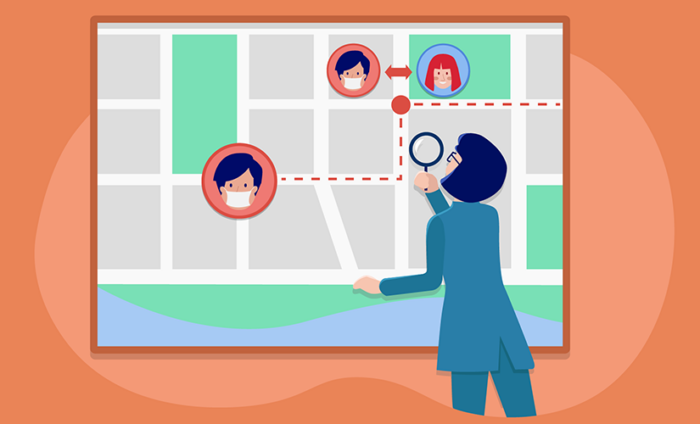Contact tracing is a well-known practice that public health professionals have regularly employed through the years to control infectious diseases. As Dr. Laura Breeher, the medical director of occupational health services at the Mayo Clinic, explains, contact tracing “is a ‘cornerstone’ of preventative medicine.”
Since the outbreak of the COVID-19 pandemic in early 2020, contact tracing has entered mainstream consciousness, largely thanks to the prevalence of the topic on social media. Many believe that these efforts can bring a rapidly spreading pandemic under control.
In this article, we’ll explain the key concepts of contact tracing and how you can implement it in your organization by using online forms.
What is contact tracing?
Contact tracing is a proven method of identifying and managing people who may have been exposed to an infectious disease. By tracking the movements and interactions of these people, public health authorities can contain the spread of a virus, quarantining and providing medical care to those who need it.
This technique requires some detective work. Trained medical staff interview people infected with or exposed to a virus, retracing their steps over several days or weeks. With this information, they can identify other people who may now have the virus.
How does contact tracing work?
The purpose of contact tracing is to limit the contact that infected people have with others, which, in turn, reduces the likelihood of transmission.
The process includes several key steps:
- Confirm that a person has tested positive for the virus. This individual is known as the index case.
- Interview the index case to gather information about their movements, sexual partners, and anyone they have interacted with recently.
- Speak to others who may know about the index case’s contacts since the estimated time of infection. For example, if authorities believe the index case has had COVID-19 for a week, they may also interview family members and health care providers who interacted with the index case.
- Identify contacts and get in touch to offer them counseling, virus screening, and treatment if needed.
- Use media and digital tools for mass communication if it’s impossible to identify individual contacts who may have been exposed at a large public event.
- Isolate contacts in accordance with public health regulations for the virus in question. For example, in the case of COVID-19, contacts must self-isolate at home for up to 14 days.
- Quarantine the index case or any contact that displays advanced symptoms by keeping them in dedicated hospital bays for treatment.
People risk exposure to highly contagious viruses like COVID-19 when standing within 6 feet of an infected individual for as little as 10 minutes. When infected individuals visit a crowded location or attend a large event — like going to a shopping mall or a football game — it could trigger a spike in cases and make tracking everyone exposed challenging.
Thankfully, online forms make the process of contact tracing a lot easier — even when social distancing.
How online forms make contact tracing easier
Medical organizations use contact tracing forms to monitor anyone who has tested positive for a virus or those who currently display symptoms without a positive diagnosis.
Typically, a contact tracing form includes the following fields:
- Name
- Address
- Details of symptoms with a corresponding timeline
- Contact details (e.g., phone number or email address)
- Location and contact details of anyone who may have come into contact with the patient
Hospitals, doctors’ offices, and even businesses can use Jotform’s online forms to conduct contact tracing. People can access the forms through your website, email, or social media channels.
When people complete and return the form, you can collect the information on desktop, laptop, or mobile devices and store it online on a secure drive or in your Jotform account.
By gathering this information, your organization will gain a holistic view of the virus’s spread — in the local area or within your business. Online forms enable you to track the situation as it develops, giving you valuable information to slow the infection rate.
You can use Jotform’s drag-and-drop Form Builder to customize your contact tracing form, add your logo, change fonts and colors, and include additional questions. With over 100 free form integrations, it’s easy to store your online contact tracing forms in third-party platforms like Google Drive or Dropbox.
Make privacy a priority to enhance contact tracing success
Contract tracing is a vital tool in virus control. With the help of online forms, health authorities and businesses can work together, leveraging digital tools to tackle the spread of disease.
While technology enables better contact tracing, it’s essential to keep personal privacy in mind.
Jotform’s online contact tracing forms are HIPAA-friendly, so you can be confident knowing that all data is secure. With this added level of trust and data protection, people will be more willing to provide information that will assist in combating the pandemic.








































































































Send Comment: